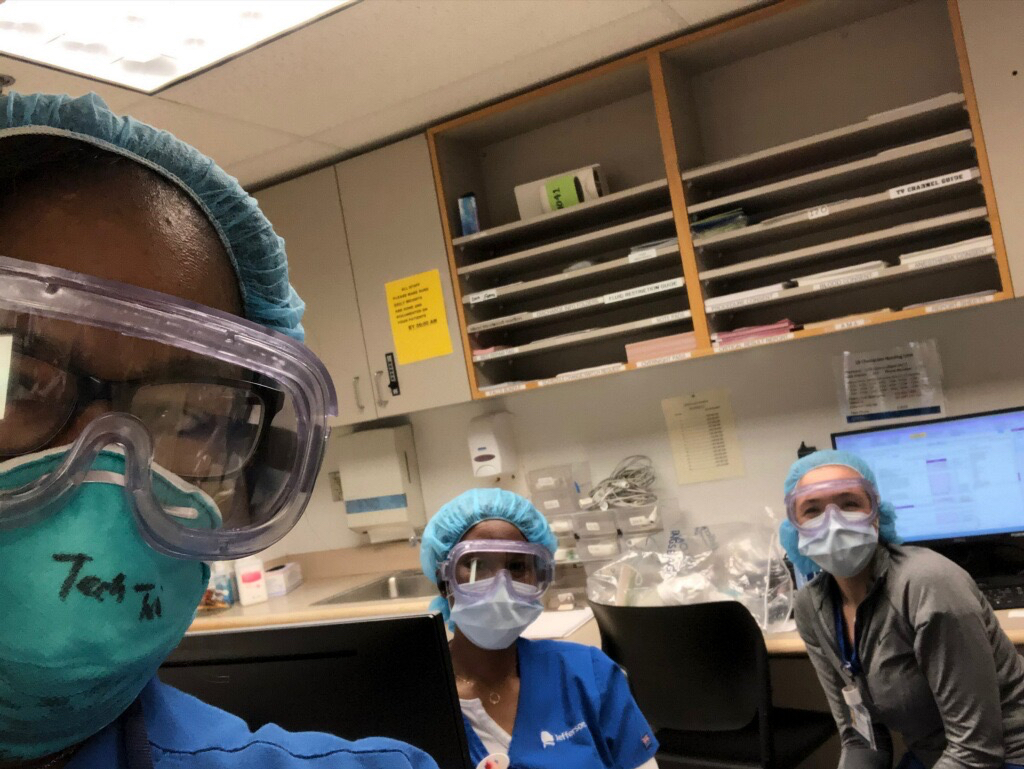Nursing Students Ready for COVID-19 Front Lines
Over 400 Jefferson graduates to soon enter the field.
Jefferson student Grace Cho knew she wanted to become a nurse at age 7 when she watched wide-eyed with excitement as her mom gave birth to her little sister.
“I still remember that day so vividly,” she says. “The labor and delivery nurses let me cut the umbilical cord after she popped out. They explained everything. That experience stuck with me and pushed me in this direction.”
In a year like none other, Cho will graduate this May and start as a neonatal intensive care nursery nurse at Thomas Jefferson University Hospital in August. She will enter the profession potentially still in the throes of the COVID-19 pandemic, but Cho says her current work as a Jefferson nurse extern has helped to quell most nerves about the future.
She participates in regular hospital town halls where Jefferson nurses can hear the latest updates and get their questions and concerns addressed.
“They’re making sure everyone is safe and prepared,” she says. “It makes me feel a lot less anxious coming into the healthcare setting in a scary time.”
Of course, Cho isn’t alone. Nearly 420 Jefferson nursing students will graduate in May and August, many going right to the front lines to battle COVID-19.
“This is what it’s all about,” says student Sasha Lawson, who stepped away from a career as a massage therapist for nursing. “I felt like I wanted more, and this was the next step for me. I had two pretty sick parents, and I saw the difference that nurses made in their lives.”
Lawson currently works in the emergency department at Abington Hospital–Jefferson Health as a nurse tech. After graduating this month, she hopes to stay in the emergency department or go into pediatrics.
“The silver lining is there are jobs for us,” she says, “and we will learn things that we may not have learned if we were graduating at another time.”
Nursing student Catherine Gibbs also looks ahead optimistically. After years of experience working in area emergency medicine services (and most recently, up in New York City), she plans to become a prehospital nurse in Philadelphia after her August graduation.
“I’m excited to enter the nursing field and take a load off the providers who been through this pandemic from the very beginning,” she says. “Hopefully, we can come in and give them a little bit of a reprieve.”
The Class of 2020 will be able to join their colleagues sooner than many anticipated. Graduates of nursing programs traditionally must pass the RN licensing exam, NCLEX-RN, before they can practice. However, the pandemic forced the temporary closure of many testing sites as a safety precaution.
Rather than making them wait for testing sites to reopen on a widespread basis, the Pennsylvania Department of State suspended some nursing licensing and regulatory requirements.
The Pennsylvania State Board of Nursing now allows new grads to enter the practice environment earlier and delay taking the NCLEX-RN exam—with certain restrictions. Once Jefferson students finish their degree requirements and the state verifies their education, they will be issued an authorization to test and a graduate permit.
I’m excited to enter the nursing field and take a load off the providers who been through this pandemic from the very beginning.
“Our grads are prepared at the highest level,” says Dr. Marie Ann Marino, dean of the Jefferson College of Nursing. “They will make a huge impact on patient care, especially during this current crisis.”
This step will allow them to practice under the supervision of an experienced nurse and sit for the NCLEX-RN once testing centers open back up widely, likely later this year.
“It’s such a benefit and gift they’re giving us that we’re allowed to work,” says Lawson, urging on her fellow graduates. “Unknowns are scary, but there is an end. We can make a difference. Just keep pushing forward.”
Gibbs, too, offers words of encouragement to her classmates soon entering a chaotic time in healthcare.
“Believe in yourself and your abilities,” she says. “We’re ready to go.”



